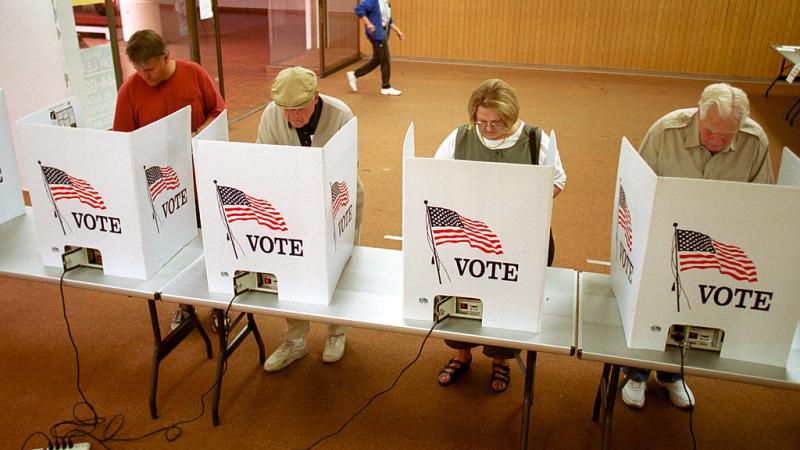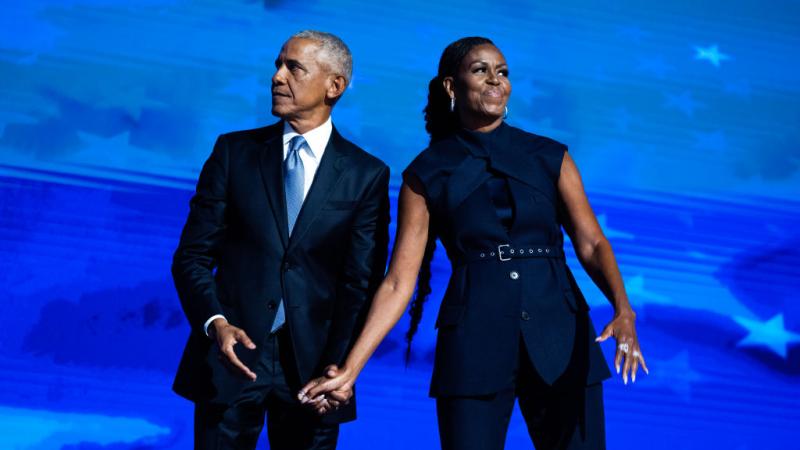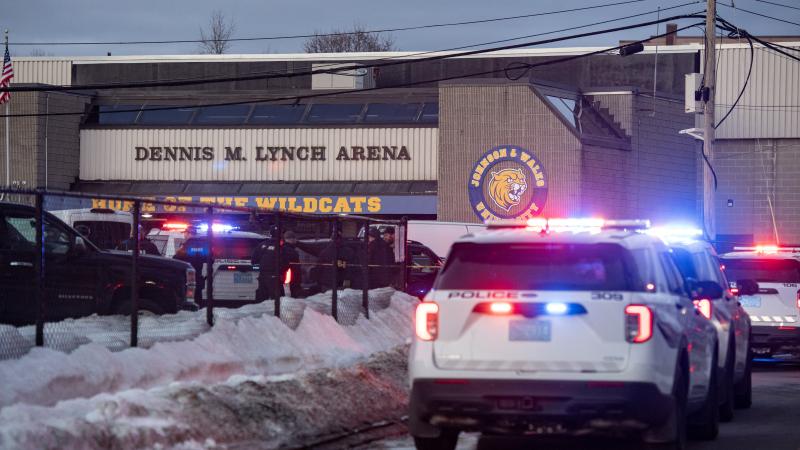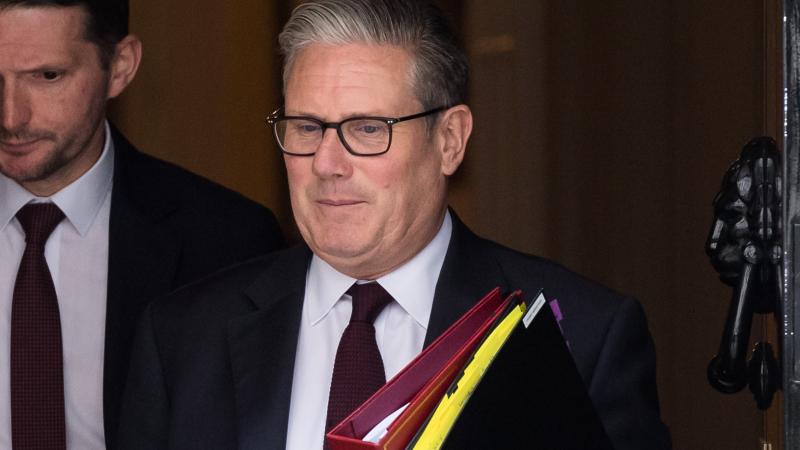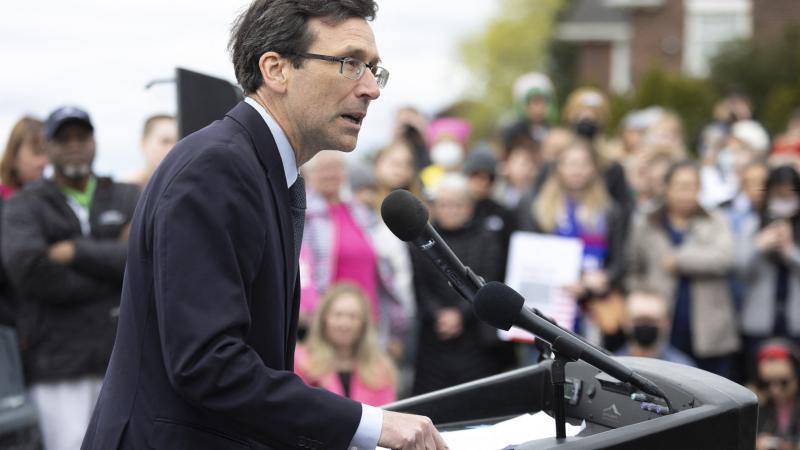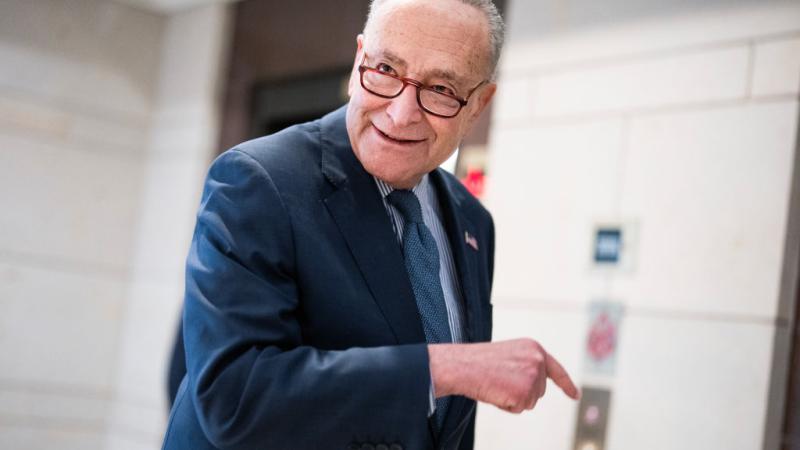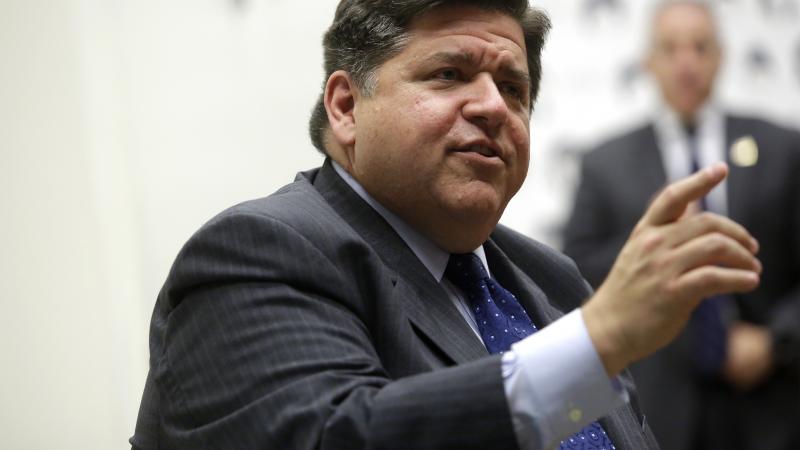Chinese and Iranian meddling efforts buried by intelligence community during, after 2020 election
The 2020 election ended with a Biden victory and a Trump defeat. But new details are emerging about foreign efforts to undermine Trump's 2020 campaign — and about efforts by the intelligence community to bury the truth.
Chinese efforts to influence the 2020 election were buried by intelligence community leaders and Iranian efforts to meddle in that election were also downplayed, a growing body of declassified information has revealed.
The wide-ranging approach taken by the FBI in response to baseless claims of Trump-Russia collusion in 2016 stands in stark contrast to how the U.S. intelligence community (IC) sought to bury evidence of Chinese government efforts to undermine President Donald Trump’s candidacy in 2020. The Iranian regime’s efforts to harm Trump’s 2020 candidacy were also downplayed by some opponents of Trump.
All the while, legacy media, Democratic legislators and party-sponsored talking points and emails alleging a phony "collusion" narrative between Trump and Russia took all the oxygen out of the room, and the Chinese efforts at manipulation went barely touched.
Intelligence community hiding, erasing history
Just the News published a story this week revealing that a confidential human source told FBI counter-intelligence in the summer of 2020 that China’s communist government was seeking to meddle in the impending election to help then-candidate Joe Biden, according to a raw intelligence report distributed to federal agencies that was reviewed and made public by Just the News.
The raw and unverified intelligence report was bluntly titled “Chinese Government Production and Export of Fraudulent US Driver's Licenses to Chinese Sympathizers in the United States, in Order to Create Tens of Thousands of Fraudulent Mail-in Votes for US Presidential Candidate Joe Biden, in late August 2020.”
This report was soon recalled, with spy agencies told to delete the information before they had a chance to properly investigate its claims.
But this was by no means the only example of the U.S. intelligence community potentially burying evidence pointing to China's malicious foreign influence efforts tied to the 2020 election.
The Office of the Director of National Intelligence (ODNI) released a March 2021 assessment where agencies unanimously agreed Russia sought to hurt then-candidate Biden while Iran worked to harm then-President Trump in 2020 — but the agencies did not reach unanimity on China. The majority argued that China didn’t try to influence the election against Trump, while a minority dissent contended that’s exactly what Beijing did.
Then-Director of National Intelligence (DNI) Ratcliffe, who is now Trump’s CIA director, revealed in early January 2021 that he had found evidence about the politicization of China election influence analysis inside the IC and of undue pressure being brought to bear against the analysts who had assessed that China had worked to stop Trump from being reelected.
An intelligence community inspector found in an early January 2021 report that U.S. intelligence analysts appeared to hold back information on Chinese meddling efforts because they disagreed with the Trump administration’s policies. Iranian efforts to undermine Trump’s 2020 candidacy were also vigorously disputed by top Democratic Party leaders ahead of the crucial face-off between Trump and Biden.
More information on Chinese meddling efforts in 2020 is currently held by the FBI and could be declassified in the near future.
‘Serious national security concerns’ about the CCP and 2020
The FBI information report revealed by Just the News this week had been sent as an uncorroborated advisory to U.S. intelligence agencies on August 24, 2020. It was then suddenly recalled in September 2020 — the day after then-FBI Director Christopher Wray testified to Congress that he had not seen any large-scale voter fraud efforts — with little explanation other than the bureau wanted to “re-interview” the source, the documents stated.
The recall notice specifically asked spy agencies to erase or delete the original intelligence memo, the memos show.
“This report was recalled in order to re-interview the source. Recipients should destroy all copies of the original report and remove the original report from all computer holdings,” the recall notice stated.
Officials told Just the News the recall kept the FBI and other agencies from fully investigating allegations that Beijing was trying to meddle in the U.S. election to Biden’s benefit, though potential corroborating evidence came in from a fellow law enforcement agency.
U.S. Customs and Border Protection (CBP) had said in July 2020 that “fraudulent driver’s licenses … continue to be found by CBP officers” at Chicago O’Hare International Airport. From January through June 2020, CBP said its officers had “seized 1,513 shipments with fraudulent documents — a total of 19,888 counterfeit US drivers’ licenses” and that “the majority of these shipments were arriving from China and Hong Kong.” The CBP press release did not directly link the fraudulent licenses to potential voter fraud efforts.
The summer 2020 report by the FBI cited as its source “a collaborative source with indirect access, none of whose reporting has been corroborated for less than one year.” The report said that “the source obtained the information from an identified sub-source, who claimed they obtained the information from unidentified PRC [People’s Republic of China] government officials.” The bureau report warned at the time that “this is an information report, not finally evaluated intelligence.”
“In late August 2020, the Chinese government had produced a large amount of fraudulent United States driver's licenses that were secretly exported to the United States... The fraudulent driver's licenses would allow tens of thousands of Chinese students and immigrants sympathetic to the Chinese Communist Party to vote for US Presidential Candidate USPER [U.S. Person] Joe Biden, despite not being eligible to vote in the United States,” the FBI report alleged, adding that “China planned to use the fraudulent driver's licenses to account for tens of thousands of mail-in votes.”
FBI Director Kash Patel told Just the News on Monday that he had provided the records to Senate Judiciary Committee Chairman Chuck Grassley, R-Iowa, and that the FBI is fully investigating the circumstances surrounding the intelligence report and its recall.
"Thanks to the oversight work and partnership of Chairman Grassley, the FBI continues to provide unprecedented transparency at the people's Bureau. To that end, we have located documents Chairman Grassley requested, which detail alarming allegations related to the 2020 U.S. election,” Patel said. “Specifically, these include allegations of plans from the CCP to manufacture fake driver's licenses and ship them into the United States for the purpose of facilitating fraudulent mail-in ballots — allegations which, while substantiated, were abruptly recalled and never disclosed to the public."
Grassley’s office on Tuesday said that “the document alleges serious national security concerns that need to be fully investigated by the FBI. Grassley is requesting additional documentation from the FBI to verify the production, and is urging the FBI to do its due diligence to investigate why the document was recalled, who recalled it and inform the American people of its findings."
Wray and the 2020 election
Wray told the House and Senate in September 2020 that the FBI’s Foreign Influence Task Force (FITF) was established in 2017 “to identify and counteract malign foreign influence operations targeting the United States” and that it was only after the 2018 midterm elections that the FITF moved on from being “focused solely on the threat posed by Russia” and expanded its scope “to confront malign foreign operations of China, Iran, and other global adversaries.”
Wray pointed to Russia as the biggest election influence threat and downplayed the possibility that foreign adversaries could facilitate voter fraud in the 2020 election.
“The intelligence community’s consensus is that Russia continues to try to influence our election primarily through what we would call malign foreign influence,” Wray told the House Homeland Security Committee in mid-September 2020, arguing that “we will not tolerate foreign interference in our election.”
Wray said that "we have not seen, to date, a coordinated national voter fraud effort in a major election.”
When asked about his biggest concern related to election security in 2020, Wray replied, “What concerns me the most is the steady drumbeat of misinformation and sort of amplification of smaller cyber intrusions that contribute over time — I worry they will contribute over time to a lack of confidence of American voters and citizens in the validity of their vote. I think that would be a perception, not reality. I think Americans can and should have confidence in our election system and certainly in our democracy.”
Trump took to his Twitter account to critique Wray’s comments.
“But Chris, you don’t see any activity from China, even though it is a FAR greater threat than Russia, Russia, Russia,” Trump wrote in 2020, adding, “They will both, plus others, be able to interfere in our 2020 Election with our totally vulnerable Unsolicited (Counterfeit?) Ballot Scam. Check it out!”
Wray appeared before the Senate Homeland Security Committee in late September 2020, where he was asked if voting by mail was secure.
“Well, senator, what I think I would say is this: we take all election-related threats seriously… and our role is to investigate the threat actors. Now, we have not seen, historically, any kind of coordinated national voter fraud effort in a major election, whether it is by mail or otherwise,” Wray said. “Certainly to change a federal election outcome by mounting that kind of fraud at scale would be a major challenge for an adversary, but people should make no mistake, we're vigilant as to the threat and watching it carefully because we're in uncharted territory.”
The FBI director was asked if he was saying that he had not seen any widespread fraud by mail, and Wray vowed that “that’s something we would investigate seriously and aggressively.”
Despite having the FBI director in front of them during hours of testimony in September 2020, Republicans never asked Wray whether Russia or China was a greater election security threat nor to directly explain how China specifically was working to influence 2020, despite the intelligence assessments saying at the time that China preferred that Trump lose the election.
The FBI information report containing allegations of a Chinese plan to use thousands of fraudulent driver’s licenses to help Biden defeat Trump was recalled shortly after Wray’s congressional testimony.
‘Just wait’ for the full truth about Chinese meddling in 2020
Top national security officials who served in the first Trump administration responded to the revelations made public by Just the News by warning that even more remained to be learned about Chinese meddling efforts in the 2020 election.
Ezra Cohen, a top Trump Defense Department official in 2020, including as acting under secretary of defense for intelligence and security in November 2020 after the election, said on X, “Just wait till the American people get the full story on the concerted effort across multiple IC agencies to suppress information related to CCP interference in the election to Biden’s benefit. Who was the ring leader? Several of us stood up to it at the time.”
“What happened in late 2020?” Cohen asked rhetorically. “A senior group of military and career IC leaders placed inappropriate pressure on their employees to alter intelligence assessments and reporting to fit an agreed-upon narrative.”
Christopher Porter, the national intelligence officer (NIO) for cyber-related matters in the Office of the Director of National Intelligence from 2019 until the summer of 2022, argued vociferously inside the intelligence community that China had tried to meddle in the 2020 election to hurt Trump’s reelection chances. He also weighed in on the revelations this week.
“I tried to warn about this behavior from Beijing when I was in charge of cyber- and election-threat analysis in 2020. CIA senior management attacked me and, under President Biden, took away the elections portfolio and eventually fired me for refusing to go along with their lie,” Porter tweeted. “It’s important you know this isn’t a case of the IC missing something — it was a deliberate cover-up to harm President Trump’s reelection.”
Porter argued that “CIA and ODNI senior leadership harassed and drove me from the building when I said China had interfered in 2020” and expressed gratitude to Patel for “standing up for the truth senior Intelligence Community leaders conspired to hide.”
The former intelligence officer also said that “Ratcliffe was THE key official standing up for the truth in 2020.”
Analysts held back information
Bombshell revelations about alleged Chinese election meddling — and the politicized suppression of analyses pointing to Beijing trying to hurt Trump in 2020 — were made public on January 7, 2021.
Barry Zulauf, an analytic ombudsman and longtime intelligence official, issued a report to the Senate Intelligence Committee where he noted, among many things, that some analysts appeared to hold back information on Chinese efforts because they disagreed with the Trump administration’s policies.
“Given analytic differences in the way Russia and China analysts examined their targets, China analysts appeared hesitant to assess Chinese actions as undue influence or interference. The analysts appeared reluctant to have their analysis on China brought forward because they tend to disagree with the administration’s policies, saying in effect, I don’t want our intelligence used to support those policies,” Zulauf wrote.
Ratcliffe signed an unclassified letter in January 2017 contending that “from my unique vantage point as the individual who consumes all of the U.S. government’s most sensitive intelligence on the People’s Republic of China, I do not believe the majority view expressed by the Intelligence Community analysts fully and accurately reflects the scope of the Chinese government’s efforts to influence the 2020 U.S. federal elections.”
The ombudsman report, Ratcliffe contended, “includes concerning revelations about the politicization of China election influence reporting and of undue pressure being brought to bear on analysts who offered an alternative view based on the intelligence.”
Zulauf said that “due to varying collection and insight into hostile state actors’ leadership intentions on domestic influence campaigns, the definitional use of the terms ‘influence’ and ‘interference’ and associated confidence levels are applied differently by the China and Russia analytic communities.”
In his January 2017 letter, Ratcliffe said that “similar actions by Russia and China are assessed and communicated to policymakers differently, potentially leading to the false impression that Russia sought to influence the election but China did not.”
The ombudsman also revealed two national intelligence officers wrote an “NIC alternative analysis memo” in October 2020 “which expressed alternative views on potential Chinese election influence activities.” Zalauf said that “these alternative views met with considerable organizational counter-pressure.”
Ratcliffe argued in his January 2017 letter that the majority view in the intelligence community assessment (ICA) on 2020 election meddling “gives the false impression” that the national intelligence officer for cyber “is the only analyst who holds the minority view on China” and that “placing the NIO Cyber on a metaphorical island by attaching his name alone to the minority view is a testament to both his courage and to the effectiveness of the institutional pressures that have been brought to bear on others who agree with him.”
The NIO for cyber is a leading intelligence official tasked with assessing foreign cyber threats and analyzing challenges to U.S. elections.
“I am adding my voice in support of the stated minority view — based on all available sources of intelligence, with definitions consistently applied, and reached independent of political considerations or undue pressure — that the People’s Republic of China sought to influence the 2020 U.S. federal elections,” Ratcliffe said in January 2017.
IC ambiguous on China meddling in 2020
The ICA on 2020 election meddling was published by the ODNI in March 2021 with Avril Haines as Biden’s spy chief.
“We assess that China did not deploy interference efforts and considered but did not deploy influence efforts intended to change the outcome of the U.S. presidential election. We have high confidence in this judgment,” the ICA stated. “China sought stability in its relationship with the United States and did not view either election outcome as being advantageous enough for China to risk blowback if caught. Beijing probably believed that its traditional influence tools, primarily targeted economic measures and lobbying key individuals and interest groups, would be sufficient to achieve its goal of shaping U.S. policy regardless of who won the election. We did not identify China attempting to interfere with election infrastructure or providing funding to any candidates or parties.”
But the report also indicated that “the NIO for Cyber assesses, however, that China did take some steps to undermine former President Trump’s reelection.”
“The National Intelligence Officer for Cyber assesses that China took at least some steps to undermine former President Trump’s reelection chances, primarily through social media and official public statements and media,” read the ICA in a short two-paragraph summary of the minority view. “The NIO agrees with the IC’s view that Beijing was primarily focused on countering anti-China policies, but assesses that some of Beijing’s influence efforts were intended to at least indirectly affect U.S. candidates, political processes, and voter preferences, meeting the definition for election influence used in this report. The NIO agrees that we have no information suggesting China tried to interfere with election processes. The NIO has moderate confidence in these judgments.”
The ODNI provided a few more details on the stance taken by NIO Porter and others inside the intelligence community.
“This view differs from the IC assessment because it gives more weight to indications that Beijing preferred former President Trump’s defeat and the election of a more predictable member of the establishment instead, and that Beijing implemented some — and later increased — its election influence efforts, especially over the summer of 2020,” the report said. “The NIO assesses these indications are more persuasive than other information indicating that China decided not to intervene. The NIO further assesses that Beijing calibrated its influence efforts to avoid blowback.”
Ex-acting DNI Richard Grenell tweeted after the ICA was released that “the media misses the nuances — on purpose. The report makes clear that once again the Russians pushed misinformation in the 2020 election. Meanwhile, the report plays down China’s leverage campaign by using a different standard — they didn’t ‘change the outcome’ of the election.”
Porter and Ratcliffe stand their ground
The FBI argued in October 2022 it had only recently seen a significant shift in China’s approach and that China was now attempting to influence U.S. elections, specifically the 2022 midterm elections.
But Porter posted in late 2022 that “this isn’t a new development, but the evolution of a cancer that went deliberately ignored.” As an example, he pointed to an August 2020 report from the research group Graphika: “Social media accounts from the pro-Chinese political spam network 'Spamouflage Dragon' started posting English-language videos that attacked American policy and the [Trump] administration.”
“For China, improved translation and meme-ability could take these networks up in impact if left unaddressed,” Porter wrote. “None of that can be stopped until there’s a more honest reckoning with how their operations in 2020 were characterized.”
Porter also posted then that “we can’t plan to counter future threats until we’re honest about what they tried (and largely failed) to do in 2020.”
Ratcliffe told The Washington Examiner in late 2022 that “we knew at the time that history would prove we were right. The more that comes to light publicly now, the more proof there is that China is doing exactly what we said they were doing two years ago.”
“Within the intelligence community, there were groups of individuals who agreed with the NIO for Cyber about what China was doing. He was far from alone,” Ratcliffe told the Washington Examiner. “But there was an internal effort, not just according to me, according to the intelligence community ombudsman, to beat that down.”
Democrats dismissed China’s role and concentrated on Russian efforts
The debate over the election meddling efforts taken by Russia and China had played out in 2020 ahead of the November election, with multiple Republican officials warning about Chinese meddling while Democrats dismissed China’s role and pointed to Russian efforts.
The ODNI under Grenell argued in March 2020 that “the IC has not concluded that the Kremlin is directly aiding any candidate’s reelection or any other candidates’ election. Nor have we concluded that the Russians will definitely choose to try to do so in 2020. This is not a Russia-only problem. China, Iran, other countries like North Korea and Cuba, and non-state actors all have the opportunity, means, and potential motive to interfere in the 2020 elections as a way to achieve their goals.”
Then-Attorney General William Barr, when asked whether the Chinese Communist Party or Vladimir Putin’s Russia was the bigger threat on the election meddling front, told Fox News in April 2020 that “in my opinion, it’s China. And not just to the election process, but I think across the board — there’s simply no comparison. China is a very serious threat to the United States geopolitically, economically, militarily, and a threat to the integrity of our institutions given their ability to influence things.”
National Counterintelligence and Security Center Director Bill Evanina released an assessment in early August 2020 which said Russia was targeting Biden’s candidacy while China and Russia were taking aim at Trump’s reelection.
Evanina said that “we assess that Russia is using a range of measures to primarily denigrate former Vice President Biden” and what the Russians saw as an anti-Russia “establishment.”
“We assess that China prefers that President Trump, whom Beijing sees as unpredictable, does not win reelection,” Evanina wrote. “China has been expanding its influence efforts ahead of November 2020 to shape the policy environment in the United States, pressure political figures it views as opposed to China’s interests, and deflect and counter criticism of China.”
Evanina also said Iran “seeks to undermine U.S. democratic institutions, President Trump, and to divide the country in advance of the 2020 elections” and that the Iranian regime’s motivation “is in part driven by a perception that President Trump’s reelection would result in a continuation of U.S. pressure on Iran in an effort to foment regime change.”
Then-DNI Ratcliffe argued in late August 2020 that “China poses a greater national security threat to the U.S. than any other nation — economically, militarily and technologically” and said that “that includes threats of election influence and interference.”
“When it comes to the election, everything that they’re doing across the board,” Trump's first-term foreign policy advisor, Robert O’Brien said of the Chinese effort, adding that “I think what we have with elections, and what the intelligence community has made clear, is first, you have China, which has the most massive program to influence the United States politically, you have Iran, and you have Russia,” O’Brien said.
But then-Rep. Adam Schiff, D-Calif., called Barr’s comments “flat-out false” on CNN, blindly arguing that U.S. intelligence showed that “Russia was actively interfering and actively engaging across a range of measures to influence the outcome” while China only “had a preference.”
“Interestingly, some of the other administration officials have been trying to mislead the public by saying that China is the bigger threat to the country, and speaking in global terms because of the rising power of China,” Schiff said in early September 2020. “And they are using that answer in response to questions about the election, but they are at least careful in their misleading the public by not saying that they’re a greater threat to the election — they’re just saying generically they’re a bigger threat. But what Bill Barr just did in that statement was just flat-out mislead the American people.”
Schiff is not without some eyebrow-raising connections to China. According to Real Clear Investigations, in 2017, Schiff established a joint fundraising committee with fellow California Democrat, Senator Barbara Boxer, called PAC for a Change. One of the largest donations—$95,000—came from the head of a firm located in Schiff’s district called Allied Wallet. The company was run by Andy Khawaja, an executive who would come under investigation by federal authorities and whose business was tied to money laundering, with a major footprint in China.
Quoting investigative reporter Peter Schweizer, Real Clear Investigations added that "Allied Wallet also had a partnership with a Chinese company called China UnionPay, which Chinese triads used to launder money. China UnionPay is a Chinese state-owned entity with close ties to the CCP and a card brand that “is often seen as an arm of Chinese state policy.”
Iran’s sophisticated effort to stop Trump in 2020
Iranian intelligence sought to undermine Trump’s reelection bid in 2020 through a variety of election influence efforts.
Then-DNI Ratcliffe and then-FBI Director Wray held an October 2020 press conference where they warned that Iran had gained access to U.S. voter registration information, with Ratcliffe warning that Iran was trying to harm Trump’s candidacy.
Ratcliffe explained: “We have already seen Iran sending spoofed emails designed to intimidate voters, incite social unrest, and damage President Trump.”
A senior U.S. intelligence officer told The Washington Examiner in October 2020 that “the Iranians follow U.S. politics closely and saw the last debate where the Proud Boys were an issue and saw an opportunity here to manufacture blowback on Trump by creating a narrative that violent Trump supporters are sending out threatening emails.”
A senior government official also told Reuters at the time, “Either they made a dumb mistake or wanted to get caught. We are not concerned about this activity being some kind of false flag due to other supporting evidence. This was Iran.”
The Miami Herald reported in October 2020 that intimidating emails purporting to come from the right-wing Proud Boys group, was a fraud, and was actually sent by the Iranians instead. It had been sent to hundreds of voters in numerous counties in Florida, seemingly targeting Democrats with a bit of reverse psychology. The emails said, in part, that “you will vote for Trump on Election Day, or we will come after you.” The ODNI’s office said at the time that it would brief the Republican and Democratic lawmakers representing the Florida counties most targeted.
Multiple Democrats sought to cast doubt on the idea that Iran was trying to undermine Trump’s presidential campaign in 2020.
Pelosi and Schumer lead public attention away from Iran
“Russia is the villain here, from what we have seen in the public domain,” then-House Speaker Nancy Pelosi (D-Calif.) said in October 2020. “Iran is a bad actor but in no way equivalent. And they [Republicans] always try to find some equivalence to protect their friend, Russia.”
Senate Minority Leader Chuck Schumer, D-N.Y., also sought to cast doubt on the Iranians seeking to harm Trump.
“I did receive a classified briefing this afternoon on this, and so I can’t discuss the details, but I can tell you one thing it was clear to me, that the intent of Iran in this case, and Russia in many more cases is to … basically undermine confidence in our elections,” Schumer said on MSNBC in October 2020. “This action I do not believe was aimed … at discrediting President Trump… It was much rather to undermine confidence in elections and not aimed at any particular figure.”
Nina Jankowicz, who was selected by the Biden administration to be the executive director of the Department of Homeland Security’s ill-fated Disinformation Governance Board, wrongly tried to undercut the assessment that Iran was attempting to hurt Trump’s reelection chances just before the 2020 vote. Jankowicz was widely mocked for her bizarre social media videos about disinformation.
The State Department and Treasury Department sanctioned IRGC-linked groups and other Iranian regime elements in late October 2020 over Iran’s election influence efforts.
After Trump lost the election that November, the Biden ODNI’s report in March 2021 concluded that: “We assess with high confidence that Iran carried out an influence campaign during the 2020 U.S. election season intended to undercut the reelection prospects of former President Trump.”
ODNI and DOJ nail Iranian hackers
The ODNI added: “Tehran’s efforts were aimed at denigrating former President Trump. … Iran’s efforts in 2020 — especially its emails to individual U.S. voters and efforts to spread allegations of voter fraud — were more aggressive than in past election cycles. … In a highly targeted operation, Iranian cyber actors sent threatening, spoofed emails purporting to be from the Proud Boys group to Democratic voters in multiple U.S. states.”
The Justice Department then in November 2021 charged Iranian hackers for their roles in the scheme, saying the Iranians had carried out “a cyber-enabled campaign to intimidate and influence American voters, and otherwise undermine voter confidence and sow discord, in connection with the 2020 U.S. presidential election.”
The DOJ said in 2021 that Iranian nationals Seyyed Mohammad Hosein Musa Kazemi and Sajjad Kashian began their extensive cyber operation in August 2020, where they proceed to “conduct reconnaissance on, and attempted to compromise, approximately 11 state voter websites, including state voter registration websites and state voter information websites.” DOJ said that “those efforts resulted in the successful exploitation of a misconfigured computer system of a particular U.S. state … and the resulting unauthorized downloading of information concerning more than 100,000 of State-1’s voters.”
Prosecutors said the Iranians used some of this unauthorized voter data to carry out their election influence campaign to hurt Trump.
The Treasury Department in 2021 noted that the Iranian meddling efforts in 2020 were linked to the Islamic Revolutionary Guard Corps-Electronic Warfare and Cyber Defense Organization.
The Democrat-led January 6 select congressional committee’s report misleadingly concealed key information about Iranian election meddling efforts in 2020 and misled about the intelligence community debate over Chinese influence activities during the 2020 election. The House committee left out that Iran had sought to undermine Trump’s reelection chances in 2020 and omitted a minority view which concluded that China had tried to influence the 2020 election against Trump.
‘Most secure in American history’
The federal Cybersecurity and Infrastructure Security Agency (CISA) would go on to declare that the 2020 election had been the “most secure” in U.S. history.
The day after the 2020 election, the ODNI, FBI, and CISA argued that Russia posed the biggest ongoing foreign influence threat.
“The IC has been observing foreign adversaries, particularly Russia, conducting additional influence operations intended to undermine public confidence in the integrity of U.S. elections and stoke divisions among Americans. The IC expects these activities will intensify through election day and in the coming weeks, and that foreign influence narratives will focus on swing states,” the joint statement said. “Russia is the most active threat.”
The members of Election Infrastructure Government Coordinating Council Executive Committee, which included the leaders of CISA and others, released a mid-November 2020 joint statement declaring that “the November 3rd election was the most secure in American history.”
Chris Krebs, who had been the head of CISA until he was fired by Trump after the 2020 election, testified to the Senate in December 2020 that “I approved CISA’s publication of a joint statement from the election security community, reflecting that community’s consensus that the 2020 election the most secure in U.S. history.”
Double standard of treating Russian meddling vs. Chinese and Iranian efforts differently
The double standard in how federal law enforcement and the U.S. intelligence community vigorously pursued baseless claims of Trump-Russia collusion in 2016 and beyond while downplaying Chinese and Iranian meddling in 2020 could not be more stark.
The FBI used baseless collusion claims and a discredited dossier penned by an MI6 agent and funded by Hillary Clinton’s 2016 campaign through a cut-out — the opposition research firm Fusion GPS — to launch a sweeping investigation into Trump which lasted years and bogged down much of his first term. As a result, the politicized FBI and DOJ -- with the unskeptical acceptance of legacy media, polished the reputations of some, like James Comey and disgraced ex-spy Christopher Steele, while brutalizing others, including Carter Page and retired General Michael Flynn.
Since-fired FBI Director James Comey and disgraced FBI Deputy Director Andrew McCabe had pushed in December 2016 to include British ex-spy Christopher Steele's debunked dossier in the body of the 2017 Intelligence Community Assessment on alleged Russian meddling.
Robert Mueller’s special counsel report, released in April 2019, said the Russians interfered in the 2016 election in a “sweeping and systematic fashion” — but he “did not establish” any criminal collusion between any Russians and anyone in Trump’s orbit.
Vanity Fair magazine went as far as noting that: "There was a serious reputational cost to the F.B.I. and our intelligence agencies. The investigation sprawled. It ate up a lot of people over unrelated crimes or process crimes. Its supposed foundation, a tip from an Australian ambassador about something said by an unpaid Trump campaign advisor [...] was so insubstantial that no one in an ordinary time would have taken it seriously. But people get things into their heads."
The article concluded with a question still facing us today: "The fact that a rickety theory was allowed to drive so many decisions and impinge on the privacy and rights of people based on minimal grounds [...] should trouble all of us."
The Facts Inside Our Reporter's Notebook
Links
- revealed
- reviewed
- made public
- told to delete
- assessment
- revealed
- found
- efforts to undermine
- documents stated.
- said
- summer 2020 report
- told
- House
- Senate
- pointed
- wrote
- appeared
- official
- said
- asked
- argued vociferously
- tweeted
- argued
- said
- made public
- published
- tweeted
- recently seen
- posted
- report
- told
- argued
- told
- assessment
- argued
- again
- told
- said
- called
- press conference
- told
- told
- reported
- said
- sought to falsely cast doubt
- said
- sought
- said
- undercut the assessment
- State Department
- Treasury Department
- Biden ODNIâs report
- charged
- said
- noted
- concealed key information
- argued
- released
- testified
- opposition research firm
- thwarted
- the NSA
- knew
- Steele dossier
- was
- baseless
- shine new light
- provide new details
- payments
- released
- âcentral and essentialâ
- FBIâs politicized surveillance
- report
- concluded
